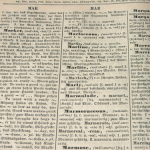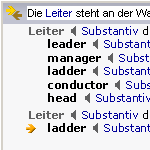 Maybe you enjoy browsing through dictionary entries and to discover ever new kinds of usage and new locutions. But mostly you will be looking for a specific translation for a given word which exactly fits in the current context. Then you need the IntelliDict® technology invented by Lingenio.
Maybe you enjoy browsing through dictionary entries and to discover ever new kinds of usage and new locutions. But mostly you will be looking for a specific translation for a given word which exactly fits in the current context. Then you need the IntelliDict® technology invented by Lingenio.
The unique IntelliDict® technology makes sure that the most suitable translation in a given context is highlighted in the display of dictionary entries.
Ambiguous Words
 Take for instance the sentence:
Take for instance the sentence:
Die Leiter steht an der Wand.
If you are looking for the translation of the word Leiter you will see what is shown in the picture. The yellow arrow (![]() ) points to the translation appropriate for the context.
) points to the translation appropriate for the context.
The IntelliDict® technology is based on a grammatical analysis of the sentence in which the word occurs which is to be looked up. Only after the analysis has been completed the most appropriate translation is determined. This even works for ambiguous words. The foundations of this technology stem from machine translation where a precise analysis of sentences is a prerequisite for good translation results.
As a user you have the advantage that even in larger dictionary entries you will immediately find the translation you are looking for without having to guess which one of several possibilities might be correct.
Phrasal Verbs
The unique grammatical analysis can easily detect expressions which consist of more than a single word and point them out. This also works for phrasal verbs and German verbs with separable prefixes. If e.g. you just select the word stellt in a sentence like
Das Unternehmen stellt Mitarbeiter ein.
then einstellen will be found and displayed.
Multiword Expressions
It is similar for sentences like
Condoleezza Rice picks a new team at the State Department.
where it does not matter whether you select State, Department or State Department; the whole expression will always be recognized and the translation Außenministerium is displayed.
Natural language processing can never be completely accurate. Thus also the IntelliDict® technology may produce incorrect analyses, in particular if the available context does not suffice to detect the intended meaning of a word. Hence it is advisable to always check the plausibility of suggested translations.
